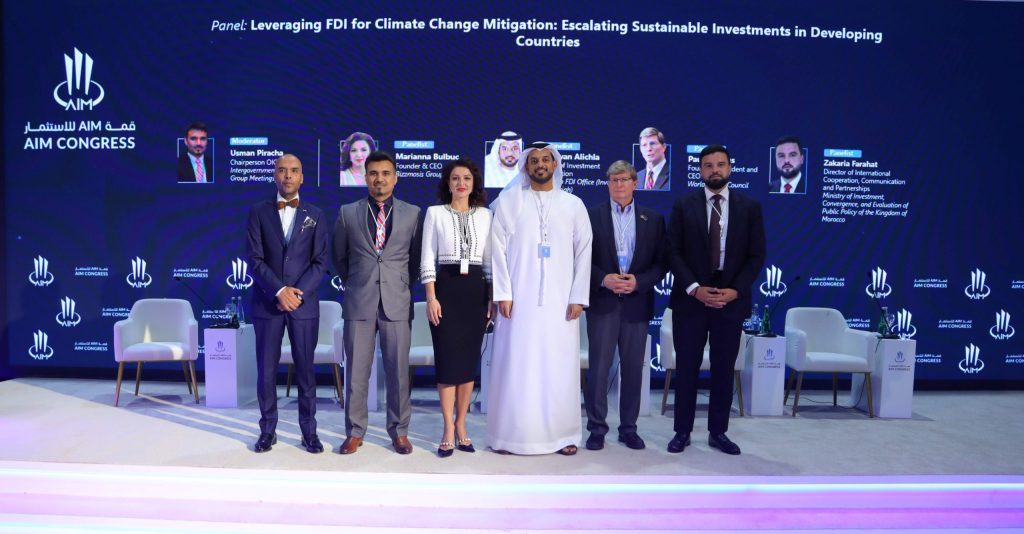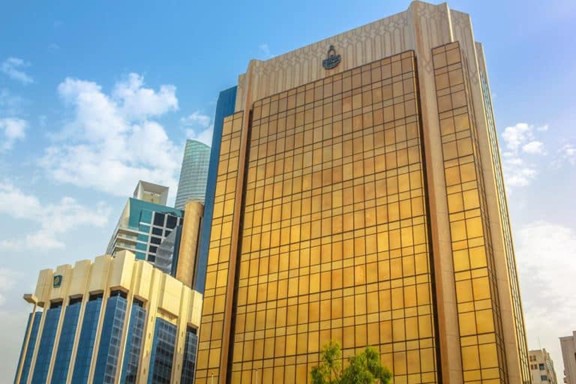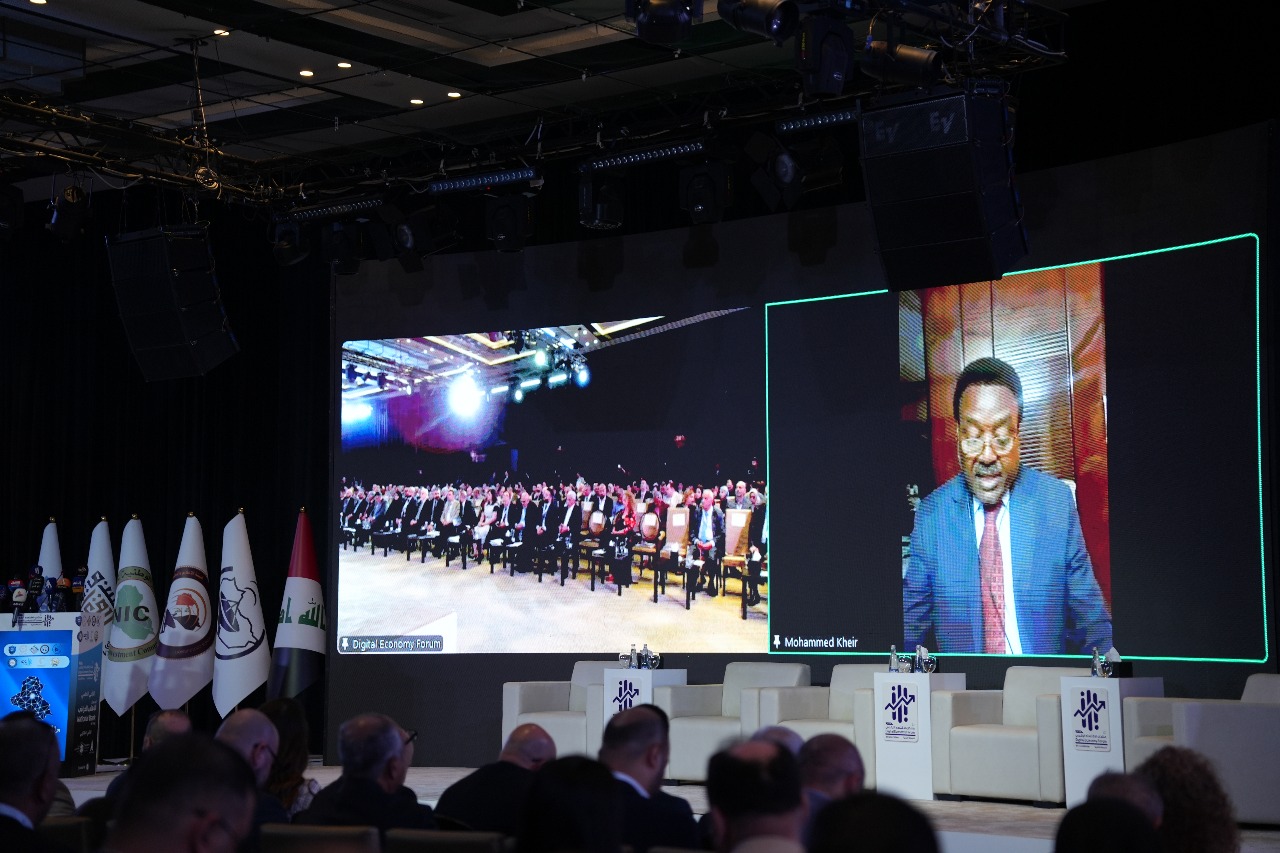The AIM Investment Summit 2024, currently being held at the Abu Dhabi National Exhibition Centre, brought together industry leaders, decision-makers, and visionaries. The summit featured a series of panel discussions within the Investment Track, the Regional Dialogue Forum, and the Investment Destinations Track, fostering dialogue, cooperation, and innovative solutions to global challenges.
The session, titled “Leaders’ Session: Geopolitical Tensions 2024: Challenges and New Destinations for FDI,” featured speakers who discussed various aspects of the FDI landscape. Participants emphasized the importance of attracting new FDI to diverse global destinations, given the intense competition in the FDI sector.
Biviana Rivero DeSla, Executive Director of the Export and Investment Center of the Dominican Republic, highlighted her country’s streamlined investment process and strategic focus on key sectors such as artificial intelligence and technology.
For his part, Daniel Silverman, Vice President of the Foreign Direct Investment Authority of Quebec, Canada, spoke about the challenges facing the FDI sector in the region, particularly regarding the privatization of the energy sector, highlighting the competitive dynamics with neighboring markets.
Ibtisam Al Farooji, Undersecretary of the Ministry of Commerce, Industry and Investment Promotion in the Sultanate of Oman, emphasized the Sultanate’s keenness to attract investments and leverage the country’s strategic location and natural resources to enhance its position as a leading global destination.
Raymond Siva, Head of Digital Investment at the Malaysian Digital Economy Corporation, emphasized the importance of digital prowess, talent, and infrastructure in enhancing investment security and growth in Malaysia.
Regarding the UAE’s foreign direct investment (FDI) sector, Massimo Falcioni, Head of Competitive Advantages at the Abu Dhabi Investment Office (ADIO), highlighted the UAE’s innovative approach to addressing challenges and transforming them into opportunities to attract FDI. He emphasized the UAE’s position as a prime destination for foreign investors seeking a stable investment environment and a thriving economy. He attributed this to the clear growth and diversification strategy set by the wise leadership, along with efforts to support and implement trade agreements and develop infrastructure.
He emphasized the importance of infrastructure, local demand, and export opportunities, along with geopolitical stability, as key factors in attracting FDI, emphasizing the importance of talent, entrepreneurship, and education as key elements for achieving success in the country.
The panel discussion, titled “Unleashing the Power of Sustainable Investment,” addressed current trends to stimulate economic growth and attract investors. The session featured discussions led by Aziza Shaat, Economic and Commercial Counselor at the Dutch Embassy in Egypt, and Dr. Pallavi Kishore, Head of the Department of Accounting and Finance at Middlesex University Dubai. They highlighted the fact that countries with strong economies are attractive sources of foreign direct investment (FDI).
Dr. Kishore stated that despite the decline in FDI in 2020 following the COVID-19 pandemic, emerging markets in the Middle East and North Africa (MENA), particularly the UAE, Saudi Arabia, and Qatar, continue to attract foreign investment.
Aziza Shaat highlighted the challenges facing FDI in the MENA region, such as the difficulty of doing business and bureaucratic obstacles. Despite these challenges, participants expressed optimism about the future of FDI in the region.
The session, titled “Leveraging Foreign Direct Investment to Mitigate Climate Change,” addressed the importance of sustainable investments in developing countries. It featured prominent speakers such as Mariana Bolbok, CEO of Bizmosis Group; Marwan Alajla, Director of Investment Promotion and Support at Invest in Sharjah; Paul Holthus, Founding President of the World Ocean Council; and Zakaria Farhat, Director of International Cooperation at the Ministry of Investment, Convergence, and Public Policy Evaluation in Morocco. They highlighted the role of foreign direct investment in supporting climate goals in developing countries.
Marwan Alajla discussed Sharjah’s strategy, which aligns with the UAE’s National Agenda, which focuses on sustainability and advanced industry. He also highlighted Sharjah’s strategic location and its success in attracting foreign direct investment, which has led to the creation of numerous job opportunities.
Marianna Bolbok praised the role of the UAE’s model of public-private sector cooperation in attracting foreign direct investment.
The forum also featured a session titled “Korea’s International Economic Policy Towards the Middle East,” presented by the Korea Institute for International Economic Policy (KIEP) and moderated by Dr. Munsoo Kang, a KIEP Fellow, who explained the institute’s primary goal: contributing to effective international economic policies in South Korea.
The discussion highlighted the significant implications of global trends and ways to strengthen trade bridges between Korea and the Middle East.
Regarding future cooperation, discussions during the session emphasized the importance of accelerating the transition to renewable energy sources as a fundamental necessity for the post-oil era, especially with the emergence of hydrogen supply chains, carbon capture and storage, and liquefied natural gas (LNG) as key areas of focus in the energy sector.
The session also included a proposal for future cooperation in the areas of digital payments, artificial intelligence, robotics, smart factories, and digital entertainment and gaming.
A panel discussion titled “Unlocking Asia’s Potential: Harmonizing Sustainability and Technology Development for Economic Development” featured a distinguished panel of speakers, including Renuka M. Weerakone, Director General of the Board of Investment of Sri Lanka; Evarist Cagatan, Executive Director and Investment Promotion Advisor of the Board of Investment of the Philippines; Wirat Tasaringkanasakul, Deputy Secretary General of the Board of Investment of Thailand; V. Enkhbaatar, Director General and Advisor to the Director General of the Investment and Trade Agency of the Embassy of Mongolia; and Raymond Siva, Head of Digital Investment of the Malaysian Digital Economy Corporation.
During the session, Jonathan Wong, Chief of the Innovation, Enterprise, and Investment Section at the Trade, Investment, and Innovation Branch of the United Nations Economic and Social Commission for Asia and the Pacific (ESCAP), emphasized the importance of addressing the investment gap in the Sustainable Development Goals (SDGs). He highlighted the attractiveness of Asia and the Pacific for investment due to its resilient economies and abundant opportunities.
The session also addressed various topics, including identifying effective locations in Asia and the Pacific as attractive destinations for sustainable development investments, persuasive messaging for investors, challenges in attracting sustainable investments, fostering an enabling environment for sustainable FDI, and enhancing regional cooperation.
Weerakone emphasized Sri Lanka’s commitment to renewable energy generation and its focus on infrastructure development and promoting gender equality. Kagatan highlighted the Philippines’ ambitions to become a hub for sustainable manufacturing in Southeast Asia, emphasizing the importance of investing in renewable energy sources and the processing of critical minerals.
For his part, Tasaring Kanasakul emphasized the close cooperation between the public and private sectors in Thailand as part of the country’s efforts to transition to renewable and clean energy. Enkhbaatar highlighted Mongolia’s rich natural resources, pointing to investor-friendly regulations and laws.
Raymond Siva highlighted Malaysia’s digital transformation strategies, its transition to a digital economy, and its focus on access to and sustainability of talent.
Another panel discussion, titled “Empowering Europe’s Future: A Strategic Investment Engine for Growth and Competitiveness,” was held within the framework of the European Regional Dialogue Forum. Lucie Berger, EU Ambassador to the UAE, emphasized the importance of leveraging crises to build resilience and enhance competitiveness.
Professor Henrik von Scheel, founder of the Fourth Industrial Revolution, and Léon Delvaux, Acting Directorate-General for Trade and Development, European Commission, also participated in the session. They emphasized the EU’s important role as a global investment player and highlighted the tremendous investment opportunities, with total foreign direct investment (FDI) in the EU amounting to $8 trillion.
The session also featured Alexis Rostand, Managing Director of Eiffel Investment Group, who emphasized his group’s focus on sustainable investment strategies and global expansion. Jean-Marie Frantz, Executive Director of the Luxembourg Trade and Investment Office, highlighted Luxembourg’s attractiveness for foreign direct investment and its leadership in green finance.
Dr. Joseph Gerada, organizer at the Family Business Office Malta, spoke about Malta’s support for family businesses and succession planning. Luca Lazzaroli, Managing Director of Portfolio Management and Monitoring at the European Investment Bank, highlighted the bank’s role in financing climate technology projects across regions.
Johannes Brunner, Commercial Counsellor at the Austrian Embassy in the UAE, and Marios Tanousis, CEO of Invest in Cyprus, also participated in the session, emphasizing the important trade relations between the European Union and the Gulf Cooperation Council (GCC) countries.
Tanousis highlighted Cyprus’ focus on technology startups, research and development, and cooperation for economic development in the European market.
The second day of the Investment Summit included the Oman Investment Destination Forum, which included a session titled “Country and Corporate Presentations,” moderated by Omar Al Harthy, Senior Business Development Executive at Invest in Oman. Speakers offered valuable insights into investment opportunities in the Sultanate of Oman, including presentations from Invest in Oman and Asyad Group, the global provider of integrated logistics services in the Sultanate.
Al Harthy highlighted the pivotal role played by the Invest in Oman platform in Oman’s economic transformation across sectors such as logistics, food security, tourism, mining, and manufacturing. The platform encourages investment in new sectors such as green cement production and boutique luxury tourism, under Oman’s investment-friendly laws and regulations. These incentives, such as up to 100 percent foreign ownership and tax exemptions, make it an attractive destination for investors seeking sustainable projects.
It’s worth noting that the Sultanate of Oman has issued and updated a number of investment laws and regulations to create a favorable environment for business startups, digital transformation across all services provided to investors, and incentives and benefits for those wishing to invest. This is part of its steady and ambitious steps to achieve its future vision, Oman 2040.
Yassin Al Busaidi, Business Development Manager at Asyad Group, highlighted the group’s focus on enhancing commercial activities by streamlining import and export processes.
The presentation highlighted the Hafeet Rail Project, a significant initiative linking Oman’s Sohar Port to the UAE’s railway network, enhancing regional integration and economic growth.











